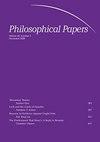World Government, Social Contract and Legitimacy
IF 1.3
3区 哲学
0 PHILOSOPHY
引用次数: 1
Abstract
Abstract The notion of world government is anathema to most political theorists. This is the case due to the arguments that a world government is infeasible, undesirable and unnecessary. This threefold argument is partly predicated on the assumption that in world politics the larger a geographical and political entity is, the greater the chance of it becoming unstable, ungovernable and, ultimately, illegitimate. On the one hand, if this assumption is correct, then a world government is likely to be illegitimate. On the other hand, if the assumption is wrong, then it is not far-fetched to consider a world government to be legitimate. Considering a world government that emerges from a global social contract, this paper contends that the legitimacy or illegitimacy of a world government and the extent to which it is legitimate or illegitimate depends on the kind of social contract that produces it and the extent to which it fulfils or fails to fulfil the conditions of the social contract.世界政府、社会契约与合法性
世界政府的概念是大多数政治理论家所憎恶的。之所以会出现这种情况,是因为有人认为世界政府是不可行的、不受欢迎的和不必要的。这一三重论点部分基于这样一个假设:在世界政治中,一个地理和政治实体越大,它变得不稳定、无法治理并最终变得不合法的可能性就越大。一方面,如果这个假设是正确的,那么世界政府很可能是不合法的。另一方面,如果这个假设是错误的,那么认为世界政府是合法的也就不牵强了。考虑到一个世界政府是从全球社会契约中产生的,本文认为世界政府的合法性或非合法性及其合法性或非合法性的程度取决于产生它的社会契约的类型以及它履行或不履行社会契约条件的程度。
本文章由计算机程序翻译,如有差异,请以英文原文为准。
求助全文
约1分钟内获得全文
求助全文
来源期刊

Philosophical Papers
PHILOSOPHY-
CiteScore
2.10
自引率
0.00%
发文量
18
期刊介绍:
Philosophical Papers is an international, generalist journal of philosophy edited in South Africa Original Articles: Articles appearing in regular issues are original, high-quality, and stand-alone, and are written for the general professional philosopher. Submissions are welcome in any area of philosophy and undergo a process of peer review based on initial editor screening and refereeing by (usually) two referees. Special Issues: Topic-based special issues are comprised of both invited and submitted papers selected by guest editors. Recent special issues have included ''Philosophy''s Therapeutic Potential'' (2014, editor Dylan Futter); ''Aging and the Elderly'' (2012, editors Tom Martin and Samantha Vice); ''The Problem of the Criterion'' (2011, editor Mark Nelson); ''Retributive Emotions'' (2010, editor Lucy Allais); ‘Rape and its Meaning/s’ (2009, editor Louise du Toit). Calls for papers for upcoming special issues can be found here. Ideas for future special issues are welcome.
 求助内容:
求助内容: 应助结果提醒方式:
应助结果提醒方式:


